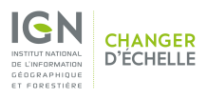|
|
[n° ou bulletin]
[n° ou bulletin]
|
Dépouillements

 Ajouter le résultat dans votre panier
Ajouter le résultat dans votre panierenviroCar: A citizen science platform for analyzing and mapping crowd-sourced car sensor data / Arne Bröring in Transactions in GIS, vol 19 n° 3 (June 2015)

Titre : enviroCar: A citizen science platform for analyzing and mapping crowd-sourced car sensor data Type de document : Article/Communication Auteurs : Arne Bröring, Auteur ; Albert Remke, Auteur ; Christophe Stasch, Auteur ; et al., Auteur Année de publication : 2015 Article en page(s) : pp 362 – 376 Note générale : bibliographie Langues : Anglais (eng) Descripteur : [Vedettes matières IGN] Géomatique web
[Termes IGN] acquisition de données
[Termes IGN] capteur terrestre
[Termes IGN] diagnostic
[Termes IGN] données localisées des bénévoles
[Termes IGN] interface web
[Termes IGN] milieu urbain
[Termes IGN] réseau de capteurs
[Termes IGN] trafic routier
[Termes IGN] véhicule automobileRésumé : (auteur) This article presents the enviroCar platform for collecting geographic data acquired from automobile sensors and openly providing those data for further processing and analysis. By plugging a low-cost On-Board Diagnostics (OBD-II) adapter into a car and using an Android smartphone, various kinds of sensor data measured by today's cars can be collected and uploaded on to the Web. Once available on the Web, these data can be used to monitor traffic and related environmental parameters. We analyse the OBD-II interface and its potential usage for environmental monitoring, e.g. to estimate fuel consumption and resulting inline image emissions, noise emission, and standing times. Next, we present the main contribution of this article, the system design of the enviroCar platform. This system design consists of the enviroCar app and the enviroCar server, which allows for flexible geoprocessing of the uploaded data. We focus in this article on the description of the spatiotemporal RESTful Web Service interface and underlying data model specifically designed for handling the mobile sensor data. Finally, we present application scenarios in which the enviroCar platform can act as a powerful tool, e.g. regarding traffic monitoring and smarter cities (e.g. the detection of pollutant emission hotspots in the city), or towards applications for a quantified self (e.g. monitoring fuel consumption). We started the enviroCar project in 2013 and have been able to attract a growing number of participants since then. In a crowd-funding initiative, enviroCar was successfully funded by volunteers, demonstrating the interest in this platform. Numéro de notice : A2015-678 Affiliation des auteurs : non IGN Thématique : GEOMATIQUE Nature : Article nature-HAL : ArtAvecCL-RevueIntern DOI : 10.1111/tgis.12155 En ligne : http://dx.doi.org/10.1111/tgis.12155 Format de la ressource électronique : URL article Permalink : https://documentation.ensg.eu/index.php?lvl=notice_display&id=78304
in Transactions in GIS > vol 19 n° 3 (June 2015) . - pp 362 – 376[article]Metadata topic harmonization and semantic search for linked-data-driven geoportals: A case study using ArcGIS online / Yingjie Hu in Transactions in GIS, vol 19 n° 3 (June 2015)

Titre : Metadata topic harmonization and semantic search for linked-data-driven geoportals: A case study using ArcGIS online Type de document : Article/Communication Auteurs : Yingjie Hu, Auteur ; Krzysztof Janowicz, Auteur ; Sathya Prasad, Auteur ; Song Gao, Auteur Année de publication : 2015 Article en page(s) : pp 398 - 416 Note générale : bibliographie Langues : Anglais (eng) Descripteur : [Vedettes matières IGN] Géomatique
[Termes IGN] ArcGIS
[Termes IGN] diffusion de données
[Termes IGN] géoportail
[Termes IGN] langage naturel (informatique)
[Termes IGN] métadonnées géographiques
[Termes IGN] partage de données localisées
[Termes IGN] traitement du langage naturel
[Termes IGN] web sémantiqueRésumé : (auteur) Geoportals provide integrated access to geospatial resources, and enable both authorities and the general public to contribute and share data and services. An essential goal of geoportals is to facilitate the discovery of the available resources. Such a process relies heavily on the quality of metadata. While multiple metadata standards have been established, data contributers may adopt different standards when sharing their data via the same geoportal. This is especially the case for user-generated content where various terms and topics can be introduced to describe similar datasets. While this heterogeneity provides a wealth of perspectives, it also complicates resource discovery. With the fast development of the Semantic Web technologies, there is a rise of Linked-Data-driven portals. Although these novel portals open up new ways to organize metadata and retrieve resources, they lack effective semantic search methods. This article addresses the two challenges discussed above, namely the topic heterogeneity brought by multiple metadata standards and the lack of established semantic search in Linked-Data-driven geoportals. To harmonize the metadata topics, we employ a natural language processing method, namely Labeled Latent Dirichlet Allocation (LLDA), and train it using standardized metadata from Data.gov. With respect to semantic search, we construct thematic and geographic matching features from the textual metadata descriptions, and train a regression model via a human participants experiment. We evaluate our methods by examining their performances in addressing the two issues. Finally, we implement a semantics-enabled and Linked-Data-driven prototypical geoportal using a sample dataset from Esri's ArcGIS Online. Numéro de notice : A2015-679 Affiliation des auteurs : non IGN Thématique : GEOMATIQUE Nature : Article nature-HAL : ArtAvecCL-RevueIntern DOI : 10.1111/tgis.12151 En ligne : http://dx.doi.org/10.1111/tgis.12151 Format de la ressource électronique : URL article Permalink : https://documentation.ensg.eu/index.php?lvl=notice_display&id=78307
in Transactions in GIS > vol 19 n° 3 (June 2015) . - pp 398 - 416[article]












